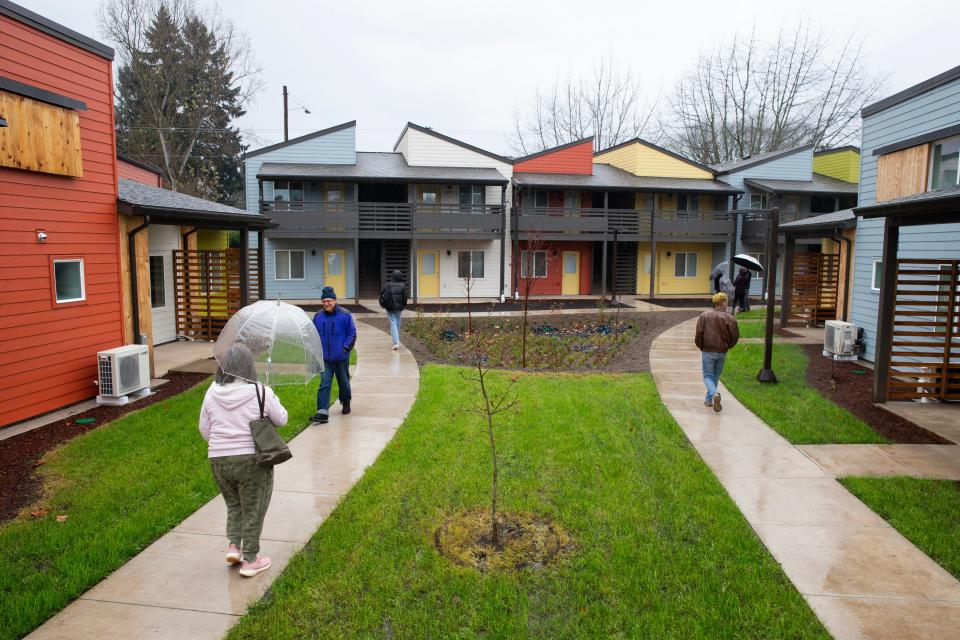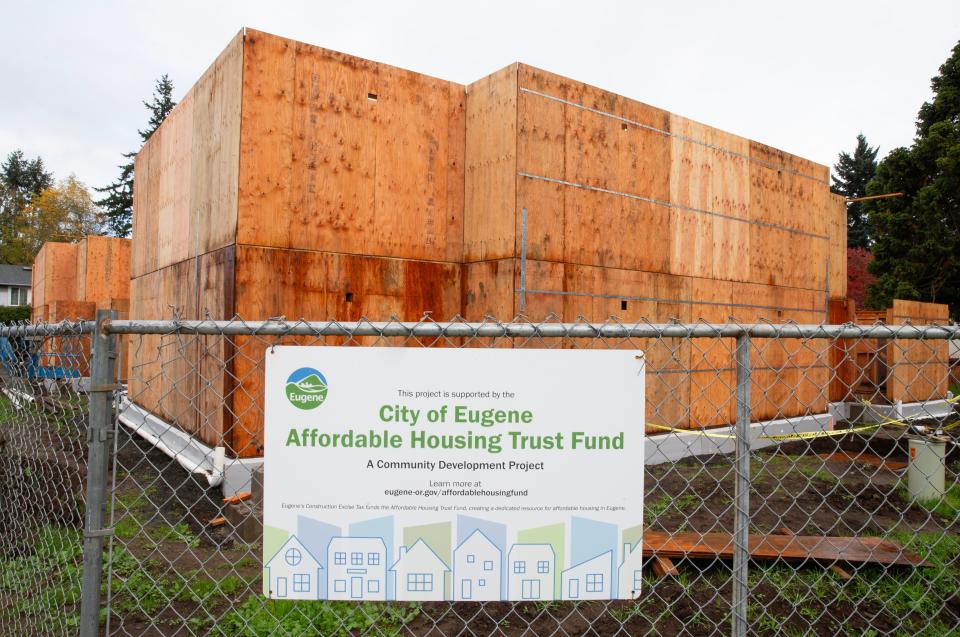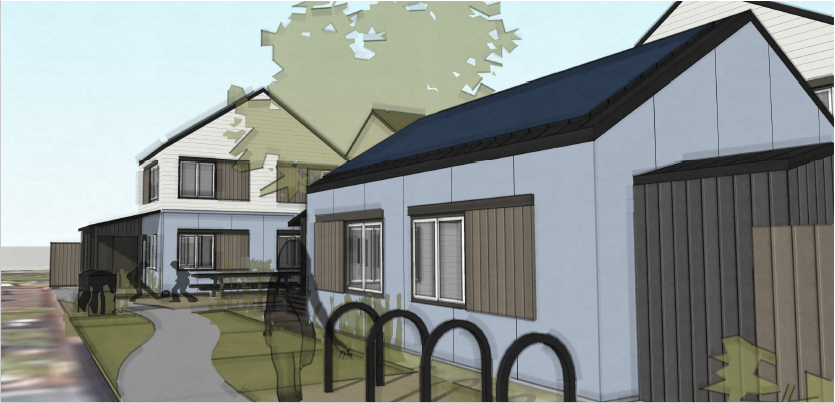Eugene's affordable housing effort: 2-year report outlines positive impacts

A new report reveals that Eugene's ongoing efforts to support affordable housing development are starting to help the community.
The City of Eugene released the two-year report for the Affordable Housing Trust Fund (AHTF) this month, sharing positive outcomes in leveraging resources, creating new homes, preventing homelessness and supporting new homeowners.
Why does Eugene have an Affordable Housing Trust Fund?
Stable housing is impacted negatively by rising rent rates and low rates of vacancy. To make progress in reducing the stress of the housing market in Oregon, state and municipal legislatures are working to shrink barriers that make it difficult to develop more accessible and affordable housing to meet demands.
On her first day in office, Gov. Tina Kotek signed an executive order establishing a goal for statewide housing production and a Housing Production Advisory Council to help address and remove barriers. Kotek’s housing production goal is to develop 36,000 units of affordable housing across the state each year in order to make up for the state's estimated shortage of 140,000 housing units.
The AHTF provides developers with city-generated funding to assist in partially financing housing projects.
Program Outcomes
Outcomes from the AHTF are assessed from fiscal year 2020 through fiscal year 2023. Fiscal years run from June to July. The report is generated by Eugene’s Community Development Division and its Planning and Development Department.
Since funds were first collected in 2019, the program has celebrated positive outcomes, including:
Awarding $2.3 million in development finances to leverage $45 million to fund the construction of 178 Affordable Housing units in Eugene,
Funding the development of 74 new owner-occupied homes, 56 permanently supportive housing units for people exiting homelessness, 38 permanent supportive units for people with conviction histories and 10 supportive transitional housing units for Veterans exiting homelessness,
Providing $488,000 of rental assistance and foreclosure prevention service funds to over 100 local families and individuals,
Supporting BIPOC and low-income households with $281,000 of down payment assistance funds to assist in the purchase of homes, which have supported four households to date.
Construction Excise Tax
Oregon didn’t allow for the collection of Construction Excise Taxes (CET) before 2016 when the state approved the use of CETs as a means to support the funding of affordable housing. Since the collection of CETs was approved in Oregon, seven jurisdictions now collect them to fund the development of affordable housing.
Since its passage by the city council in 2019, Eugene’s Construction Excise Tax has been a dedicated revenue source for the AHTF. CETs are collected on new residential and commercial buildings, additions, alterations and all improvements resulting in new structures, extending square footage of existing structures or additions to existing living spaces. City code mandates the review of outcomes and management of CET funding and the AHTF program every two years.
Since the city began collecting both commercial and residential CETs to support the AHTF, over $5 million has been collected and recycled into the Trust Fund.
AHTF Challenges
Laura Hammond, housing tools analyst for the city of Eugene, said one of the barriers to developing affordable housing is the cost of construction, so the AHTF subsidizes part of the cost.
“One of the fundamental challenges is funding, always. I think with rising construction costs and interest rates, we’re just seeing that the same number of units are needing more subsidies to happen,” Hammond said. “That’s where we feel very fortunate in the city of Eugene that we have such a flexible tool like the Affordable Housing Trust Fund.“
Hammond said the city’s land acquisition program purchases land and then gets it “shovel-ready” for affordable housing developers.
“Of course, in Eugene, finding good sites and land for affordable housing projects can be challenging sometimes,” Hammond said.
Additional challenges presented to developers of housing include how to align municipalities’ goals for housing production with the Governor’s statewide goals. The goals for the AHTF come directly from Eugene’s Housing Implementation Pipeline, which focuses housing production efforts on three areas including homelessness, income-qualified housing and the overall supply of housing. Eugene’s HIP goals and the AHTF were established prior to Gov. Kotek’s executive order for housing production and work in line to achieve the same goals.
In 2022, there were 20,321 housing permits issued across Oregon with 1,759 of those permits being issued in Lane County. While permit numbers for 2023 have yet to be made available, statewide production goals mean that Oregonians can expect to see developers aim to apply for 15,679 more housing permits in 2024 and beyond than they did in 2022.
Use of AHTF: FY22 & FY23
Housing developments receiving awards from the AHTF in the 2023 fiscal year include:
Peace Village, which received $670,000 from the Eugene City Council as well as $547,901 in City Fee Assistance to cover costs for building permit applications and System Development Charges. The 70-unit housing cooperative developed by SquareOne Villages provides an accessible path to homeownership for residents earning less than 60% of the area's median income,

Williams Place, which received $350,00 in development funds from the city council and $102,743 in City Fee Assistance. The development, managed by St. Vincent de Paul, aims to provide 10 units of transitional housing to Veterans who are or are at risk of experiencing homelessness,

The Coleman, which received $552,650 in AHTF grants and will get $470,847 in City Assistance Fees. The mixed-use building, developed by Homes For Good, plans to provide 38 apartment units and on-site services through partnership with Sponsors, Inc. to support individuals with conviction histories,
Bridges on Broadway, which received $383,434 in AHTF awards and will get $173,590 in City Assistance Fees. The project aims to renovate the former Red Lion Hotel that was utilized as a temporary housing solution for individuals who lost homes in the 2020 Labor Day fires into a 57-unit permanent supportive housing community,
Grant Street Grow Homes, which received $321,528 in AHTF awards and is expected to get an additional $58,472 in City Fee Assistance. Grow homes are houses built in space typically utilized as a backyard or additional property in an effort to produce more types of middle housing. The Grant Street Grow Homes will turn an underutilized backyard into a small community of four homes with insulated attics that will allow for owners to “grow” into the home by outfitting an additional bedroom and bathroom in the attic space.

Generating, awarding and dispersing AHTF funding is a multi-year process.
Peace Village had co-op members begin moving into their new homes in December following years of project planning and development. Williams Place is currently under construction with the goal to finish building and move tenants into the transitional housing units in June of 2024. Homes For Good expects to begin construction on the three-story Coleman complex in 2024. Bridges on Broadway hopes to begin construction in the spring of 2024. The Grant Street Grow Homes are likely to see ground broken on the project in early 2024.
Direct Services
The AHTF provides direct services for mortgage and rental assistance alongside the development of housing through community partner DevNW, an affordable housing development and asset-building organization with work spanning seven Oregon counties.
Mortgage Assistance
During the 2021 fiscal year, DevNW was awarded $150,000 from the AHTF to be able to provide direct mortgage assistance to prevent foreclosures, which allowed 33 people to keep their homes between 2021 and 2022.
In 2022, DevNW was funded $281,000 for dedicated homebuyer assistance to be used through the end of 2023.
Rental Assistance
Additional direct services supported through the AHTF include rental assistance. In 2022, $100,000 of rental assistance was reserved as part of the Eugene City Council’s work on renter protections.
Karen Saxe, DevNW’s director of policy, advocacy and strategic relationships, said the AHTF is an excellent local tool that allows for more spending flexibility than other forms of state or federal funding.
“We are in the middle of a housing crisis. We need every available resource to help solve that housing crisis,” Saxe said.
“I think the Affordable Housing Trust Fund has been a really amazing way to have local support into projects because there is a part of it that goes toward actual development projects and then the city has done a really excellent job of seeing other needs and ways to use this very flexible, local resource.”
Saxe said the community's need for mortgage and rent assistance from DevNW has been increasing over the past few years. Once AHTF funding was made available to DevNW for its assistance programs, Saxe said the organization saw the need for that funding triple. Historic investments in rent assistance have been supportive but fail to meet the needs of mortgage holders also in need of financial support.
Alongside rental and mortgage assistance, DevNW provides financial education classes and foreclosure prevention counseling.
“What we know and what we see in our foreclosure prevention counseling services is that when someone is getting displaced, more often than not what that means is they’re entering the homelessness system,” Saxe said.
“We are really seeing our foreclosure prevention counseling as homelessness prevention.”
Looking Ahead
As more areas of Oregon adopt CETs to help fund affordable housing development, planners working on the bi-annual AHTF reports hope to see these retrospective reports influence good decision-making for the development of affordable and market-rate housing statewide.
“We can only hope that we continue to make good investments with these funds and help our affordable housing developers and other people who are interested in affordable housing to actually have what they need to make it possible to make those affordable units,” Hammond said.
“I think there’s a lot of hope that this will help the overall need in the community.”
Saxe said the availability of AHTF funding has been beneficial to the Lane County community and that DevNW is aligning its own production goals with Kotek’s statewide goals to meet the immediate need for more housing developments.
“Having the Affordable Housing Trust Fund funding and resources available in this community has been really a central component not only on helping some developments move forward with that local support but also on ensuring that individuals and families can maintain stability in really unprecedented times,” Saxe said.
Hannarose McGuinness is The Register-Guard’s growth and development reporter. Contact her at 541-844-9859 or hmcguinness@registerguard.com.
This article originally appeared on Register-Guard: Report released on Eugene's Affordable Housing Trust Fund

